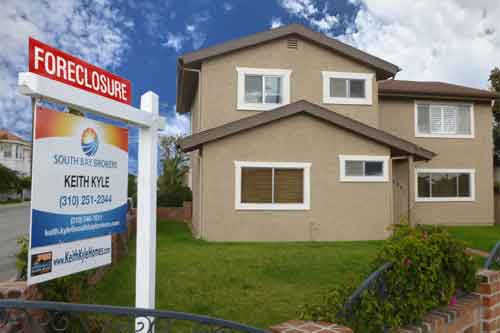Foreclosure is a general term that is used to mean several types of sales but all are “distressed” sales. The general perception is that foreclosures mean it’s a good deal. Much of the time that’s true as it requires greater patience and a level of uncertainty many buyers aren’t willing to put up with….so the price usually reflects the lower demand.
foreclosures mean it’s a good deal. Much of the time that’s true as it requires greater patience and a level of uncertainty many buyers aren’t willing to put up with….so the price usually reflects the lower demand.
Foreclosures can include short sales in which the seller is selling for less than they owe, foreclosure auctions which are very specialized sales and usually require buying sight unseen for cash, and REO also called bank owned homes in which the home has gone through the actual foreclosure process and the bank now owns the home and is the seller.
Foreclosures are prevalent during bad economic times when the housing market is affected. In a rising market like we’ve had for the last few years the foreclosure market is almost non-existent.
See Current South Bay Foreclosure Listings
What is a Foreclosure?
Foreclosure is the legal proceeding in which a bank or other secured creditor sells or repossesses a parcel of real property (immovable property) due to the owner’s failure to comply with an agreement between the lender and borrower called a “mortgage” or “deed of trust”. Commonly, the violation of the mortgage is a default in payment of a promissory note, secured by a lien on the property. When the process is complete, it is typically said that “the lender has foreclosed its mortgage or lien.”
The process of foreclosure is lengthy and the timeframes for when the lending institution begins the process vary from state to state. Other factors, such as the increasing availability of personal loans for owners facing foreclosure, present homeowners with foreclosure avoidance options. Websites which connect individual borrowers and homeowners to individual lenders are increasingly used as mechanisms to bypass banks while meeting payment obligations for mortgage providers. The increase in the number of foreclosures in the United States has led to more loan listings which are designed to forestall or prevent foreclosure.
A short sale is when a lender accepts a discount on a mortgage to avoid a possible foreclosure auction or bankruptcy. Instead of buying from a seller, you are purchasing the property directly from the lender for a discount. For example: A homeowner, who is facing foreclosure, has an existing first mortgage of $800,000. You write an offer to the lender for $725,000, which is accepted as full payment for the loan. This is a short sale. Why are they willing to take such a discount? Several reasons. First of all, banks do not like excess inventory and bad loans on their books; therefore, if they see an opportunity where they can sell the property without a huge loss, they will do it. Secondly, lenders know they could lose a lot more money if the property goes to auction. There are so many fees involved if the property goes to auction, that they would be better off taking the discount beforehand and be finished with the headache of it all.
